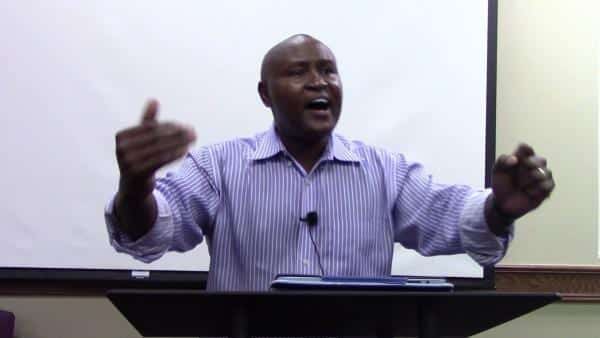
Coming to America: Kenyan professor Dr. Joseph Onesimus was part of a panel of Elgin Community College faculty members discussing their decision to leave their homelands for a new life in the United States. They compared their opinions of America then and now.
Joseph Onesimus, adjunct faculty in the college’s business department, left Kenya to attend school in the Chicago area. He remembered the “culture shock” of how cold and snowy the Midwest can get — something the other five panelists agreed upon.
He described coming to the U.S. as a “ticket to heaven.” But his arrival to the U.S. was not all positive, describing his bout with depression during his first winter here. As others enjoyed the winter holidays with loved ones, Onesimus grew homesick and had no family nearby.
Onesimus believes in the good of Americans, their generosity and giving, even as Americans grapple with matters like wealth inequality and racial tensions.
“You obey the rules, that shows an order and a great system that works right,” he said. “You don’t have to have somebody watching over you — you do what is right.”
avid Carrillo left Mexico with his family to reunite with his father and escape poverty. Clark Hallpike moved from Antigua seeking the United State’s “wealth of opportunity” he’d heard about while pursuing a higher education.
The men, who now teach at Elgin Community College, told their stories Tuesday as part of the school’s “Coming to America” panel discussion. In it they and four other ECC teachers offered insight into what made them leave their homelands for America, how they acclimated to a new world, and how they view the United States then and now.
“The reason I decided to have this program is because I wanted to show you what it was like to have people on our campus, having people from all over the world come here to our classrooms,” Hallpike said.
ECC is made up of a diverse group of students, many of who likely have similar stories to tell, he said.
Carrillo, an associate professor of human services, left Mexico in the 1960s at age 12, a few years after his father left. His father briefly lived on the streets, and was forced to delay his family’s arrival to the U.S. until he had saved enough money for a family home in south suburban Blue Island.
Carrillo’s father worked hard to provide for his family, and when Carrillo considered dropping out of college to help provide money, his father intervened.
“If you think that I brought you to this country so that you could work as hard as I do, you’re wrong. If you’re going to make it, it’s here,” Carrillo said his father told him.
Contrary to popular belief outside American borders, the streets here are not paved in gold, said Parul Raval, an education associate professor who came from Mumbai, India. Among the myths commonly heard in other countries is the United States has no poverty and everyone is wealthy, which Raval learned was not the case.
Her family settled in the West Rogers Park neighborhood of Chicago, where her parents still live. Because there is a large South Asian community there, Raval said, they were able to keep alive the traditions they’d had in India. She said she is thankful the latest generation of immigrants or descendants of immigrants continue to value their respective cultures.
When asked if she feels fully assimilated to the U.S., she said, “I’m still living through it.”
By Rafael Guerrero
Source-chicagotribune.com










Doc. Great ideas, your analysis is perfect!